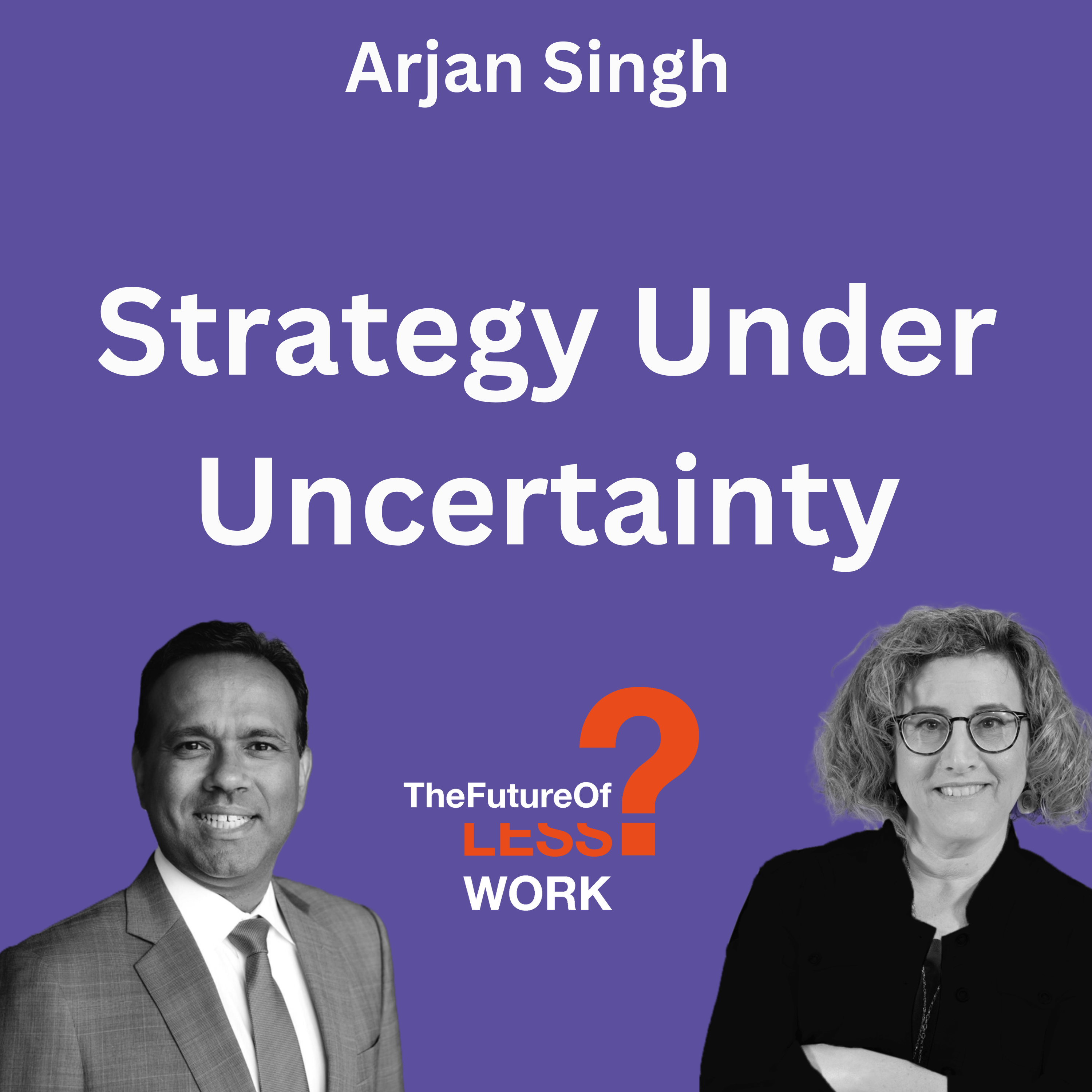The Future Of Less Work

The Future Of Less Work
Podcast Description
What if the future of work isn’t about having all the answers but about asking the right questions?
The Future Of Less Work podcast reimagines the relationships between individuals, organizations, and work. Hosted by work futurist Nirit Cohen, the podcast delves into the evolving work ecosystem through conversations with leaders, thinkers, and visionaries. Together, they explore how we are co-creating work—one puzzle piece at a time.
Podcast Insights
Content Themes
This podcast tackles diverse themes around the future of work, focusing on topics like the impact of AI, work culture evolution, and the importance of skills over titles. For instance, episodes delve into the rise of an innovation economy with leaders like LinkedIn’s Aneesh Raman, and discussions on kind leadership with Ian Sandler, offering concrete examples of how organizations can thrive in dynamic work environments.

What if the future of work isn’t about having all the answers but about asking the right questions?
The Future Of Less Work podcast reimagines the relationships between individuals, organizations, and work. Hosted by work futurist Nirit Cohen, the podcast delves into the evolving work ecosystem through conversations with leaders, thinkers, and visionaries. Together, they explore how we are co-creating work—one puzzle piece at a time.
https://workfutures.niritcohen.com/
https://linktr.ee/niritcohen
What happens when competitive advantage no longer comes from having the right plan, but from how quickly you can adapt when the plan stops working?
In this episode of The Future of Less Work, host Nirit Cohen sits down with Arjan Singh, author of Competitive Success, to explore what strategy looks like in a world defined by uncertainty, AI, and constant disruption. As organizations move away from long-term planning cycles, the conversation reframes strategy as a living capability rather than a static document.
Together, Nirit and Arjan unpack why traditional planning assumptions collapse in volatile markets, how corporate war games help leaders surface blind spots before they become costly mistakes, and why preparing for unlikely but high-impact scenarios matters more than predicting the future. They discuss how AI is reshaping decision-making by making data abundant while elevating the importance of human judgment, context, and cultural awareness.
The conversation goes beyond strategy teams and into the future of work itself. Arjan explains how continuous preparedness is changing leadership roles, why middle management must shift from reporting to decision quality, and what happens to early-career roles when routine analytical work can be automated in minutes. They also explore the risks of over-optimizing for efficiency and underestimating the nuanced human contributions that differentiate organizations in an AI-saturated world.
If you’re trying to understand how leaders, organizations, and individuals can stay relevant when certainty is gone and advantage is temporary, this episode offers a powerful framework for thinking, deciding, and competing in the future of work.
https://youtu.be/uAJvbPT7DYk
Guest Information:
Arjan Singh, author of Competitive Success: Building Strategies with Corporate War Games, is an expert in helping companies develop data-driven strategies through war games, strategic and competitive analysis, scenario planning and building business early warning systems that deliver significant impact. He has advised 68 of the top 100 companies in the Fortune Global 500 list in building winning strategies. Singh is an Adjunct Professor of Marketing and Global Consulting at Southern Methodist University (SMU) COX School of Business.
Chapters:
00:00 – How Do You Build Strategy When You Can’t Predict the Future?
01:21 – What Are Corporate War Games and Why Do Companies Use Them?
02:30 – How Do You Plan When Markets Are Unstable and Assumptions Break?
03:20 – Can You Prepare for Events That Seem Impossible or Unlikely?
05:20 – What’s the Difference Between Scenario Planning and War Gaming?
07:32 – Why Long-Term Strategic Planning No Longer Works
08:51 – What Is Continuous Strategy and How Is It Different from Annual Planning?
11:10 – What Decisions Should Humans Make When AI Handles the Data?
13:19 – How Do Leaders Balance Data, Judgment, and People Impact?
15:20 – Why Do Organizations Ignore Bad News and Worst-Case Scenarios?
17:15 – How Do You Challenge Leadership Assumptions Without Getting Shut Down?
19:33 – How Can Companies Identify Blind Spots Before Competitors Do?
21:20 – Is Being Prepared a Competitive Advantage?
23:22 – How Is AI Changing Management and Middle-Management Roles?
25:48 – Which Jobs and Skills Are Most at Risk from AI Automation?
27:44 – Are Companies Overestimating What AI Can Replace?
28:56 – How Do You Build Comfort With Ambiguity and Uncertainty?
30:14 – What Question Should We All Be Asking About the Future of Work?

Disclaimer
This podcast’s information is provided for general reference and was obtained from publicly accessible sources. The Podcast Collaborative neither produces nor verifies the content, accuracy, or suitability of this podcast. Views and opinions belong solely to the podcast creators and guests.
For a complete disclaimer, please see our Full Disclaimer on the archive page. The Podcast Collaborative bears no responsibility for the podcast’s themes, language, or overall content. Listener discretion is advised. Read our Terms of Use and Privacy Policy for more details.